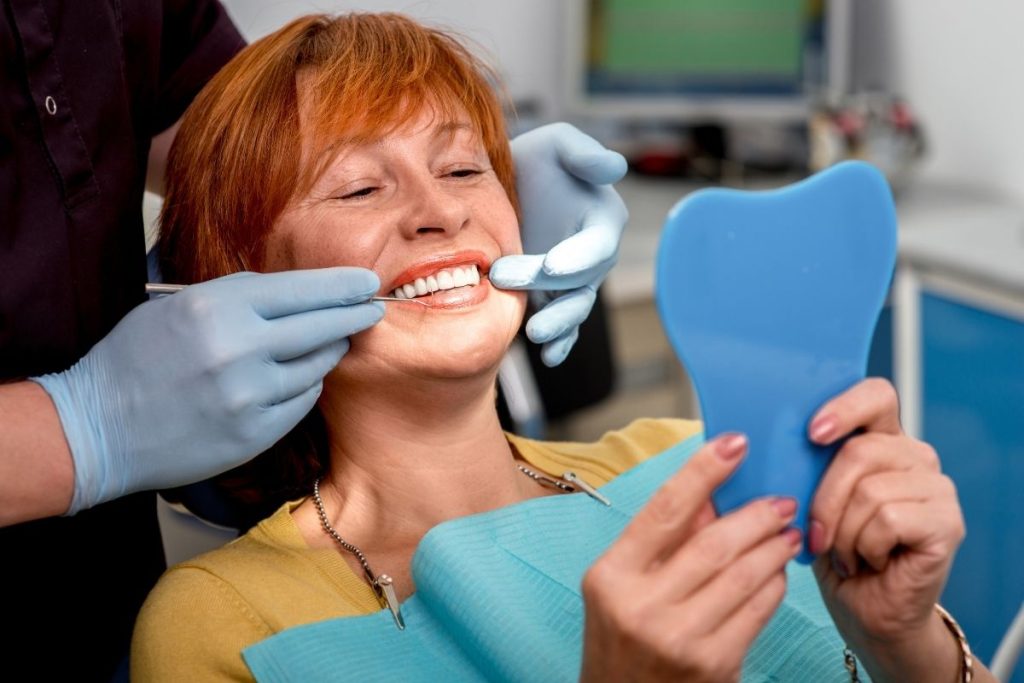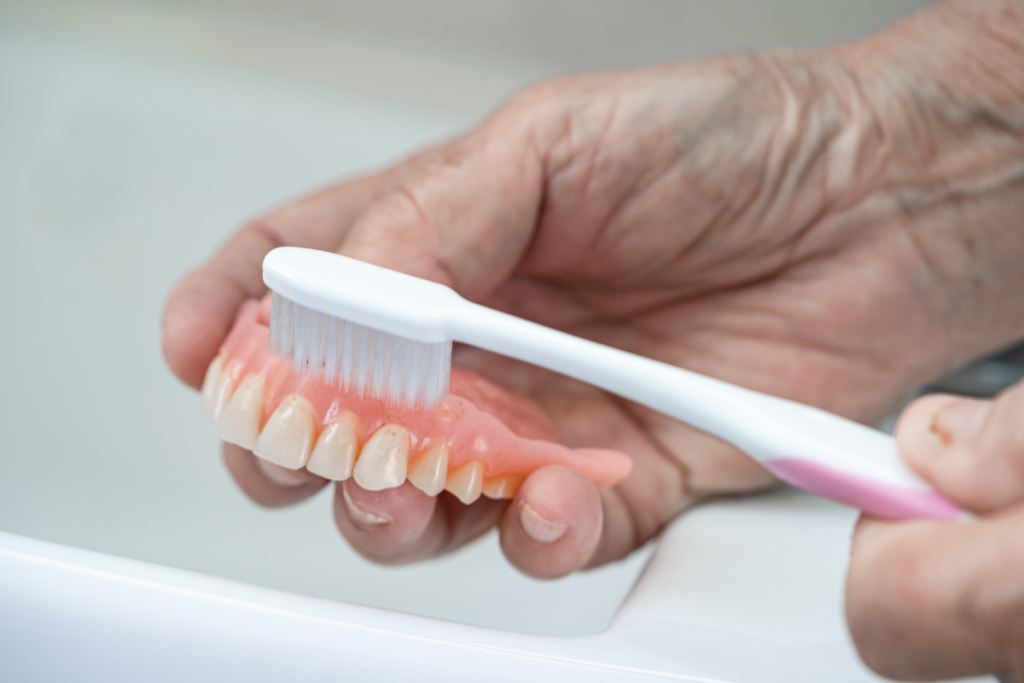What are Dentures?

Reasons Why You Need Dentures?
Missing Teeth
Lost Entire Teeth
Chipped, Damaged and Unhealthy Teeth
How do Dentures Work
Benefits of Dentures

Make Your Smile Look Better
Customised Dentures Are Made to Suit Your Mouth
You Can Clean Your Dentures Easily
Further Dental Issues May Be Decreased by Dentures
Types of Dentures
Complete Dentures
Partial Fixed Dentures
Partial Removable Dentures
Implant Retained Dentures
Immediate (Same Day) Dentures
What to Expect During Your Dentist's Appointment for Dentures

Pre-Denture Healthy Visit:
The first appointment will be to ensure that the gums and soft tissues are healthy and ready for the replacement teeth. The patient will undergo a complete physical examination, including X-rays. The X-rays are to make sure there are no unforeseen challenges with the bones underneath. We may recommend additional procedures such as removing excess flabby tissue or reshaping the bone to accommodate a tighter fit during this stage.
We will also prepare a mould of the upper and lower gums during this visit to begin the denture making process. We prefer to get them without teeth so that the laboratory has a precise impression of the gums on which to make the new dentures. Lastly, we will discuss key factors such as the shape, size, and colour of the newly created teeth with the new patient.
Denture Length and Plane Adjustment:
Denture Wax Try-In:
Denture Installment:
When Should You Get Dentures After Tooth Extraction
Can You Get Dentures if You Have Gum Disease
How to Clean Your Dentures

To keep removable partial or full dentures in good condition, they must be cleaned regularly, free of stains, and maintained properly. Following are a few tips for good denture care:
After eating, remove and rinse your dentures. Use water to rinse away any food debris and other loose particles. It may be a good idea to put a towel on the counter or in the sink or to put water in the sink so that the dentures will not break if you drop them.
Handle your dentures with care. Avoid bending the plastic or damaging the clasps while cleaning.
Maintain your dentures by brushing them every day. Clean your dentures gently every day. Dentures should be soaked and brushed with a soft-bristled brush and a nonabrasive denture cleanser to remove plaque, food, and other deposits. If you used denture adhesive to stick your dentures to your gums, clean the grooves where the adhesive had contact. Do not use any denture cleansers inside your mouth.
Let dentures soak overnight. In order for dentures to keep their shape, they need to stay moist. Overnight, soak the dentures in water or a denture-soaking solution. Ask your dentist how to store your dentures properly overnight. Also, clean and soak your dentures according to the manufacturer’s instructions.
If you are using a denture-soaking solution, make sure to thoroughly rinse your dentures before putting them back in. Chemicals in these solutions can cause vomiting, pain, or burns if swallowed.
How Often Should You Visit the Dentist if You Have Dentures
To maintain good oral hygiene, you must see your dentist regularly. Professional cleanings and checkups are often suggested every six months for people who wear complete or partial dentures in order to ensure proper dental health.
Whether you are going to your dentist to check your oral hygiene, have your dentures relined, or want to have a dental checkup, make sure you follow the appointment schedule that your dentist provides. You might be able to keep your dentures for a longer period. It can also support the health of the rest of your teeth and mouth.
How Do You Know if Your Dentures Fit Right
What Happens If Your Dentures Are Loose

Unfit dentures can lead to the following problems:
Dentures Slip
An ill-fitting denture is probably the most obvious sign. The dentures should not slip out when you eat, talk, laugh, or sneeze. If your dentures do this, an alignment or replacement may be necessary.
Denture Sores
Although you may not notice your dentures moving around in your mouth, you may notice a sign of their movement: denture sores. When dentures move, they rub against the gums in a way that leads to irritation. You will not be able to wear your dentures properly if they develop denture sores. So, never ignore this.
Denture Pain
Sores on dentures can be painful, but your dentures may cause you pain before sores develop. Pain can also result from dentures that fit snugly but have uneven bite forces, causing some areas of your mouth to be subjected to much greater forces when you chew.
Trouble Eating
You can’t eat the same foods as you did when you had natural teeth. However, most of them should be able to eat with properly fitted dentures. Trouble eating is common when your dentures are not fitted correctly. If your dentures don’t fit properly, this problem can occur right after you get them. You will need replacement dentures if this occurs. Before going home, ensure that your dentures fit correctly in the dental office.
Dentures Are Hard to Clean
Some food residue is expected on your dentures’ outside, but if you notice that more and more food particles and other types of residue are appearing on the inside, that could indicate your dentures aren’t fitting correctly. The seal should prevent material from accumulating inside the denture.
These problems can be improved by adjusting or having new, better-fitting dentures or implants. So, if you are experiencing any of these issues, don’t leave it too late!
What Should You Do if You Have Cracked or Broken Dentures
When a denture wearer’s tooth is chipped or broken, it requires prompt repair. If denture teeth break, it can long-term affect the wearer’s ability to chew and speak. It may also compromise the bite of the dentures, which can cause discomfort. Denture wearers should not attempt to repair chipped or broken denture teeth on their own. In the event of a broken or cracked tooth, one should begin by:
- Gather broken pieces, including wiring and chipped or broken tooth pieces.
- It is recommended that wearers use dental wax if wiring or clasps become uncomfortable or loose. The wax acts as a temporary barrier to prevent irritation along the gum line.
- Put dentures into a soaking solution or storage case until a dentist can examine them. Dentures that are damaged should not be worn.
- Call your dentist.
How to Take Care of Your Dentures
If you want your denture to last, you must take proper care of it. Dentures make it possible to speak clearly, chew your food, and smile with confidence. You should be able to keep your dentures in great condition if you take proper care of them. Keeping that in mind, we’d like to share some common denture care tips:
1. Take Extra Care When Handling Dentures
Despite being strong and durable, dentures can break. You should always have something soft available when handling your dentures while cleaning, just in case you drop them unintentionally.
2. Gently Clean and Brush Your Dentures
If you want your dentures to last, you should take special care of them. Cleaning your dentures for oral hygiene is important, but you also want fresh breath and a sparkling smile. In spite of that, taking proper care of your dentures and brushing your natural teeth are two different tasks, but equally important.
3. Make Dentures Adjustments Every 2 to 3 Years
Loose dentures are thought to be normal among denture wearers. So, they use denture adhesive, ignore the problem, and don’t see their dentist. This is unfortunate as regular denture maintenance improves comfort, fit, and oral health. Having a loose denture can also increase the likelihood of denture breakage while eating.
4. Store Your Dentures Properly When Not Wearing Them
When your dentures are not being worn, you should store them in a closed container out of reach of children and pets. It would be best if you kept your dentures moist by placing them in water or a denture cleaning solution. Dentures should never be placed in hot water since they can warp and lose their shape. Never throw away your spare denture; store it in a safe place just in case you need it.
Alternatives to Dentures
There are two alternatives to dentures: dental implants and tooth-supported fixed bridges.
Dental implants have become one of the most popular tooth restoration options since they closely resemble natural teeth. Since dental implants are more expensive than dentures and require healthy gums and jawbone for implantation, not everyone is suitable for this type of treatment.
While in tooth-supported fixed bridges, both sides of the gap are crowned. They serve as anchor teeth for the false replacement tooth in the middle, also called abutment teeth. Since the bridge is cemented into place, a dentist can only remove it.
How Much Do Dentures Cost
The cost of a denture depends on the type of artificial teeth needed, the materials to be used, and the location of the dental clinic. The cost of an upper and lower traditional denture in Western Australia can reach $4,000. In contrast, the total cost of upper or lower dentures (but not both) can cost as much as $2,200, according to the 2020 National Dental Fee Survey.
The average cost of dentures in Western Australia is as follows:
Complete maxillary denture (upper): $1320
Complete mandibular denture (lower): $1300
Final Thoughts
Take a step forward and start the process of getting the dentures you need by setting an appointment with us! Our meeting will allow us to get to know you better and build trust. We offer wide affordable dental solutions that can meet your needs. If you have further questions, you can call us anytime on this number (08) 9516-1003.
Disclaimer – Use At Your Own Risk :- The information on this website is for general information purposes only. Nothing on this site should be taken as advice for any individual case or situation. Any action you take upon the information on these blogs are strictly at your own risk. We will not be liable for any losses or damages in connection with the use of the information from these blogs.
source https://ashburtondentalcentre.com.au/all-you-need-to-know-about-dentures-in-ashburton-dental-centre/
No comments:
Post a Comment